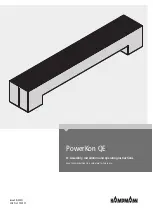
© 1995-2013 Energy Saving Products Ltd.
© 1995-2013 Energy Saving Products Ltd.
This formula can be used to find the desired
Heating
“Outlet Velocity” needed to achieve ideal airflow:
For Heating 200-250 CFM per Ton
Approximately 1100-1400 FPM Outlet Velocity
HE-B-50/51
HE-B-70/71
HE-B-100/101
1.5 Tons
2 Tons
2.5 Tons
3 Tons
3.5 Tons
4 Tons
5 Tons
12-20 Outlets
16-24 Outlets
20-28Outlets
24-32 Outlets
28-36 Outlets
32-44 Outlets
40-52 Outlets
For
Heat Only
applications, it is recommended to use max airflow. Select
the most appropriate tonnage or outlet range for your application:
200 CFM x Tonnage = Desired Heating Airflow
Desired Heating Airflow ÷ Number of Systems Total Outlets = Airflow per Outlet
Airflow per Outlet ÷ 0.021 = FPM per HE Outlet
Airflow per Outlet ÷ 0.022 = FPM per 2” Outlet
Therefore,
200 CFM x ____Tons ÷ ____ Systems Total Outlets ÷ 0.021 = ________FPM per HE Outlet
*3
200 CFM x ____Tons ÷ ____ Systems Total Outlets ÷ 0.022 = ________FPM per 2” Outlet
*4
Note: Heating speed is more lenient than cooling speed. If desired, airflow can be adjusted to noise instead of velocity or air
-
flow, as long as this selected fan speed satisfies the structures heating needs. Higher velocities over 1500 to 1600 FPM are not
recommended.
For Constant Fan 125 CFM per Ton
Approximately 500-900 FPM Outlet Velocity
This formula can be used to find the desired
Constant Fan
“Outlet Velocity” needed to achieve ideal airflow:
125 CFM x Tonnage = Desired Constant Fan Airflow
Desired Constant Fan Airflow ÷ Number of Systems Total Outlets = Airflow per Outlet
Airflow per Outlet ÷ 0.021 = FPM per HE Outlet
Airflow per Outlet ÷ 0.022 = FPM per 2” Outlet
Therefore,
125 CFM x ____Tons ÷ ____ Systems Total Outlets ÷ 0.021 = ________FPM per HE Outlet
*5
125 CFM x ____Tons ÷ ____ Systems Total Outlets ÷ 0.022 = ________FPM per 2” Outlet
*6
Note: Constant Fan is completely variable. Usually, Watt draw, velocity and noise are the determining factors in the selected fan
speed. Constant Fan is an option that is suggested for maximum indoor air quality.
Summary
Fill in the ideal velocity per outlet that was calculated above:
Cooling
________ FPM per HE Outlet
*1
________ FPM per 2” Outlet
*2
________ FPM per HE Outlet
*3
________ FPM per 2” Outlet*
4
________ FPM per HE Outlet
*5
________ FPM per 2” Outlet
*6
Heating
Constant Fan
Module HEB COM
Commissioning & User Guide (4/8)
-4-
-4-
Module HEB-COM-Commissioning-Report-and-User-Guide (4/8)


























